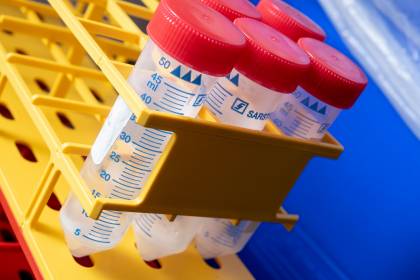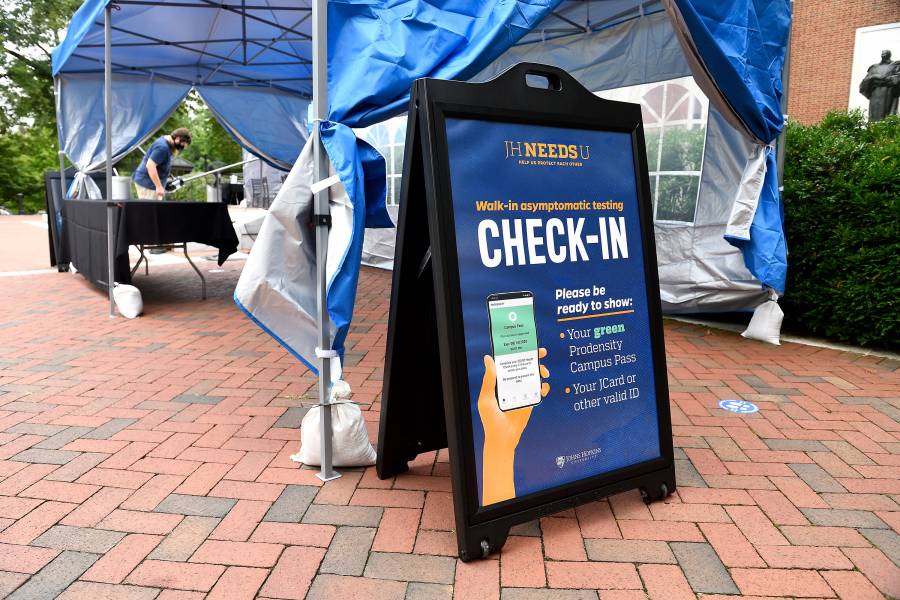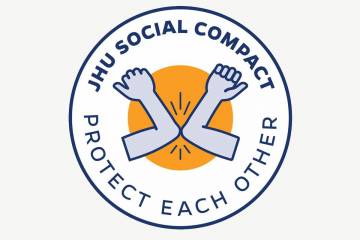More than 1,000 Johns Hopkins students, faculty, and staff are being screened for COVID-19 at campus testing sites each weekday as the university prepares to resume on-campus instruction next week, part of a multifaceted operational and safety approach meticulously prepared by JHU in anticipation of expanded activities during the spring semester.
The university has set up nine campus locations for testing—five on the Homewood campus, and one each on the East Baltimore campus, at the Peabody Institute, at the Carey Business School, and at the School of Advanced International Studies in Washington, D.C. Information about testing site locations and hours can be found on the university's COVID Information website.
With many students opting to return to Baltimore for the spring semester, several of those testing sites—particularly the Homewood campus locations—have been busy. More than 2,500 tests—including more than 2,000 at Homewood—were conducted on a single day earlier this week, according to the university's COVID-19 testing dashboard.
Of more than 8,500 tests conducted over the past seven days at Hopkins testing sites, just 54 were positive. Of 1,201 students who moved into residence halls at Homewood and Peabody, just nine tested positive.
"This has been a heavy lift for the team to create an expansive testing operation on multiple campuses—and there are nuances between divisions that add to the complexity," said Jane Schlegel, vice president and chief administrative officer. "But overall the testing has gone well, and we appreciate everyone's patience as we continue to work to resolve issues as we are notified of them."
Routine surveillance testing designed to detect and isolate cases before the virus has a chance to spread is a cornerstone of the university's public health mitigation strategy, along with social distancing, masking, regular handwashing, and mandatory flu vaccination. All undergraduates living on campus and in neighboring communities in Baltimore must be tested twice weekly, and others on JHU campuses must be tested once a week.

Image caption: All nine JHU asymptomatic testing sites employ saliva-based PCR testing, with tests processed at the Johns Hopkins Hospital laboratory in East Baltimore.
Image credit: Will Kirk / Johns Hopkins University
Test appointments are scheduled via MyChart (a link to the MyChart login page is available on the Prodensity Health tab), and all nine testing sites use saliva-based PCR testing, considered the most accurate and reliable type of COVID-19 test. Individuals are asked to limit food and drink consumption and to refrain from brushing their teeth, using mouthwash, or using tobacco products for at least one hour prior to providing their saliva sample. The entire test process takes about 10 minutes.
Tests are processed at the Johns Hopkins Hospital laboratory in East Baltimore, and test results are posted to MyChart. The majority of results are available within 24 hours. If an affiliate tests positive, they will be contacted promptly by a representative of the Johns Hopkins COVID-19 Call Center.
"We wanted to make the process as easy and as convenient as possible," said Kevin Shollenberger, vice provost for student health and well-being, "so we are thankful for the operation team's hard work in setting up these nine universitywide sample collection sites."
Posted in University News









